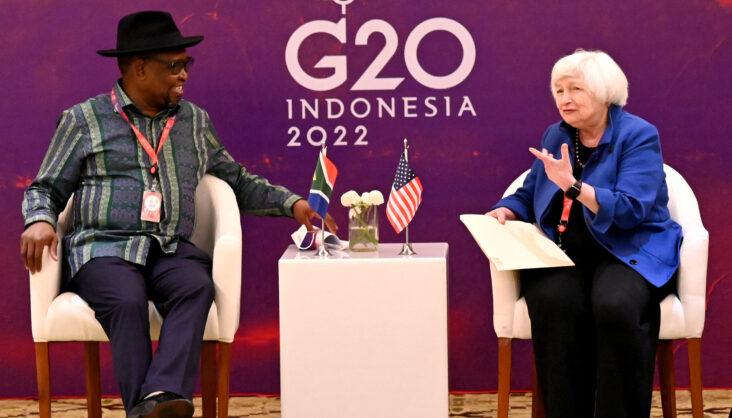Africa-Press – Lesotho. Representing over 80% of the global economy, the Group of 20 (G20) is the main multilateral platform for global economic and financial cooperation. Discussions at the group’s yearly meeting deeply relate to Africa.
The AU first attended the G20 Summit in 2010, and seven years later, the G20 Compact with Africa (CWA) was launched during Germany’s G20 presidency.
CWA was a measure to deepen the G20’s engagement with specific African countries because of the recognition that South Africa – the G20’s only African member – alone cannot effectively represent a continent as large and complex as Africa.
The customary invite to the ASEAN Chair, the African Union Chair, and the representative of the New Partnership for Africa’s Development (NEPAD) is another example of the G20’s awareness of the importance of proper representation of the international community, given the far-reaching impacts of its actions.
This commitment by the G20 core members to ‘listen carefully’ to all institutions and countries was reiterated in their 5th Anniversary Vision Statement.
However, Africa’s economic and political realities mean the AU shouldn’t just be invited to observe or be listened to carefully when requested to speak.
It has credentials for full membership and full decision-making powers. The G20 is the forum where the most important global economics conversations are taking place. Conversely, it can be considered as the economic equivalent to the United Nations Security Council.
As the only African G20 member, South Africa has been saddled with the responsibility of advancing the continent’s cause during preparations for and agreements at G20 summits.
However, in practice, South Africa has its own economic priorities and interests, which may or may not align with the context and realities of other leading African economies like Nigeria and Egypt. This should not be confused as a call for more African countries to join the G20, but for the African Union specifically to join the forum.
The African Union is a representative of the collective economic and sociopolitical interests of Africa, just like the inclusion of the European Union in the G20 – even though three European countries make up the core G20 membership.
The call for full AU membership of the G20 needs to be understood in two contexts. First, the AU’s growing centrality in Africa’s economic governance.
With the African Continental Free Trade Area (AfCFTA) forging Africa’s 55 economies into a single market since January 2021, the AU now represents an economic bloc ranked as the 8th largest in the world.
Clearly, the AU is playing a much bigger role in Africa than in previous years. As such, the AU’s inclusion in the G20 is critical for the promotion of structural solutions that benefit the entire continent.
The African Union, in essence, can serve as a vessel for other countries that do not have the same development problems as a country like South Africa.
For instance, at the just concluded Fourth African Union Coordination Meeting, AU Chair Macky Sall outlined topics of great importance to the continent, including the reallocation of Special Drawing Rights and the implementation of the G20’s Debt Service Suspension Initiative, a fair and equitable energy transition for continental access to electricity, which could be formally raised by African Union representatives in the G20 to support collective interests of African countries.
Secondly, the call for AU membership recognises that the G20 is not primarily about “benevolence” for Africa, even though so many Africa-related proposals are presented this way. The fact is the G20 needs African countries as they have vital resources to address energy challenges abroad.
For instance, they are major suppliers of critical raw materials globally, which are required in all sorts of technologies – from smartphones to electric vehicle batteries to satellites, sold and consumed globally, not only generating profits, but also productivity increases.
Including the African Union at the G20 is the practical path that leads toward holistic solutions for sustained global development and good global governance. The good news is this might just happen.
During a side-event convened by INDEF, a leading economic think-tank in Indonesia, the G20 sherpa made it clear that Indonesia is promoting the inclusion of the AU – represented by both Senegal’s Macky Sall as the current, annually rotating chairperson of the AU as well as the permanent chairperson of the commission Moussa Faki Mahamat – at the forthcoming November summit.
We have long called for the African region to be fully represented in the G20, just as the EU is with the Presidency and the Commission in attendance.
This is a similar arrangement to EU representation at the G20, which is probably the only other region globally that has as clear regional integration instruments and processes as the AU.
Indeed, Charles Michel, the president of the European Commission, has expressed support for AU membership at the G20 after pointing out that the EU took a similar route.
The question will then be whether India – the next G20 host – will formally admit the rotating and permanent representatives and therefore make the G20 a G21 with the AU as a permanent, full member.
Ebba Kalondo, the spokesperson to the chairperson of the African Union Commission, believes this would be strongly welcomed. “We have long called for the African region to be fully represented in the G20, just as the EU is with the presidency and the commission in attendance,” he says.
“Africans must be better represented at the world’s key decision forums, not just observers. The G20 can set the bar in this regard. ”
At the most important table where matters of global economic governance and international finance are decided, voices that represent one of the largest economic blocs in the world, which speaks for 16.7% of the world’s population (1.37 billion people spread across 55 diverse and innovative economies), have been missing for far too long. Indonesia and India can change that.
For More News And Analysis About Lesotho Follow Africa-Press






